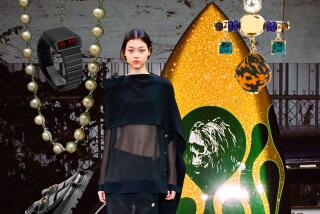Cash-Rich Hong Kong Is Very Conspicuous About Consumption
- Share via
HONG KONG — Walk into any 7-Eleven store in this British colony, look past the Slurpee machine to the liquor selection and start counting; chances are up to a dozen brands of French cognac will be on display.
Welcome to Hong Kong, where prosperity and an obsession with status blend to create what may be the world’s capital of conspicuous consumption.
Cognac flows like water, luxury cars jam the streets, pricey portable telephones are the rage, and droves of people spend small fortunes on flashy wristwatches.
“There’s a lot of ostentatious display among Hong Kong people . . . because the achievement of wealth is such a driving force in people’s lives,” explains S. K. Cheong, head of marketing for Television Broadcasts Ltd., the territory’s No. 1 television station.
A recent international survey conducted by the marketing firm Backer Spielvogel Bates Worldwide found that nearly half of Hong Kong people say owning expensive cars and jewelry are important goals.
Only one-third of Japanese and one-quarter of Americans surveyed felt the same way.
Here are the statistics that tell the story:
* About 12% of the private cars on Hong Kong roads are Mercedes-Benz, which cost from nearly $40,000 to more than three times that amount, according to C. P. Moore, managing director of the local dealership.
“As far as we know, that is the highest penetration on Earth” for Mercedes, he said.
Nearly 1,000 Rolls-Royce luxury automobiles, which can cost almost $400,000, cruise the local streets, giving this tiny British colony of 5.7 million people the “highest concentration of Rolls-Royces in the world,” said Russell Blythe, sales and marketing manager of the Hong Kong dealer.
* Nearly 50 brands of wristwatches, most of them among the priciest on the market, were advertised on Hong Kong’s four television channels last year.
* Bulgari, an exclusive Italian manufacturer of jewelry, has two stores in Hong Kong and eight for the rest of the world. The most popular Bulgari watches cost about $4,500 but are often out of stock here.
* About 100 fur retailers are listed in the 1990 telephone book of this subtropical city, whose climatic claim to fame is stifling heat and humidity for much of the year.
* About 70,000 hand-held portable telephones, which generally cost $1,500 or more, have been sold in Hong Kong, although pay phones and community phones are ubiquitous.
* Per capita consumption of cognac is widely believed to be the highest in the world, with 357,000 cases of brandy entering the colony last year, or slightly more than one bottle per person age 20 or older.
Shelves of neighborhood food stands often are stocked with bottles priced at $200.
In explaining such sales, local analysts note that the rapid growth of Hong Kong’s export-led economy in the last decade made millionaires of many local entrepreneurs and left countless other people with money to spend. The low business and personal tax rates in the colony have ensured a high level of disposable income.
But the thirst for status, or “face,” among the local Chinese appears to be the main driving force behind the colony’s conspicuous consumption.
“When they have accumulated some wealth they like to spend it on visible things to show off,” said Joseph Wan, finance director for Dickson Concepts Ltd., which has recorded 50% compound annual growth for the last five years by selling expensive name brands in Hong Kong and elsewhere in the region.
“It’s an affluent city, everybody wants respect,” agrees James J. S. Wong, host of the popular late-night talk show “No Restrictions Tonight.”
Cheong, the television marketing manager, believes social pressure is intense to acquire possessions that flaunt one’s wealth. He acknowledged considering buying a wristwatch for several thousand dollars because of peer pressure.
Still, the local demand for status-enhancing products may not be limitless. Sales of some luxury goods fell after Chinese troops ruthlessly quashed the pro-democracy movement in Beijing, and the long-term health of the market is unclear with Hong Kong being handed over to Communist China in 1997.
Although Beijing has guaranteed that Hong Kong can maintain its freewheeling capitalist ways until the middle of the 21st Century, many local residents are skeptical of such promises.
But for now, capitalism and conspicuous consumption remain very much alive in the territory.
“I see it as a beauty of Hong Kong rather than a minus,” said Wong. “You work hard and you make your fortune, and now you’re allowed to show that.
“It’s another form of freedom.”
More to Read
Sign up for Essential California
The most important California stories and recommendations in your inbox every morning.
You may occasionally receive promotional content from the Los Angeles Times.













